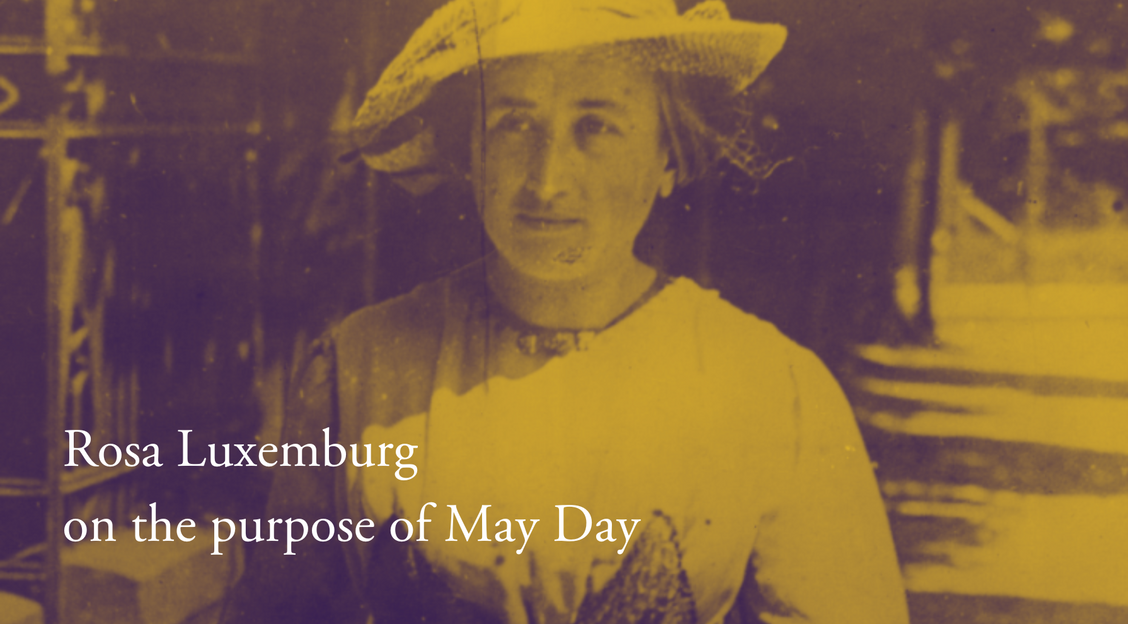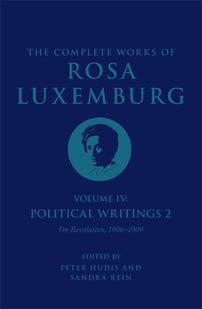Rosa Luxemburg on the purpose of May Day
Rosa Luxemburg observes the changing pulse of the proletarian struggle from the May Day celebrations in 1907.

May Day celebrations are a living historical part of the international proletarian class struggle, and because of this, they accurately reflect the last twenty years of all phases, all moments of this struggle. Viewed from a distance, it is always the same monotonous repetition of identical speeches and articles, identical demands and resolutions. That is also why those whose gaze only clings to the rigid surface of things and who do not feel the imperceptible inner becoming of the circumstances believe that the May Day celebration has lost its meaning through the repetition, that it has almost become “an empty demonstration.”
But under this seemingly identical form of appearance, the May Day celebrations conceal the changing pulse of the proletarian struggle, which shares a life with the workers’ movement and therefore changes with it, reflecting in its own ideas, in its mood, in its tension the changing situations of the class struggle.
May Day has gone through three great phases in its history. In the first years, when it had to initiate its course, it was greeted by proletariats of all countries with tense expectations and high spirits. The working class added a new weapon to its armament, and the first attempts to use this weapon bolstered the sense of strength and the joy of fighting for the millions of exploited and oppressed. On the other hand, the bourgeoisie of all countries met the new demonstration of class struggle with the greatest fear and deepest hatred.
The thought of the international socialist demonstration appeared to them as the reborn specter of the old, much-hated International, the bold attempt at a simultaneous, worldwide labor celebration as the death knell of all capitalist glory. Hence the frantic preparations in the initial years to confront the dangers of May Day with brutal police and military force. And as the vanguard of this weapon-studded convoy of the frightened bourgeoisie, the “free republic” of France threw itself into battle, joined only afterward by tsarist absolutism. The first proletarian blood for the cause of the May celebration flowed in 1891 in Fourmies; in 1892, there was a bloody May battle in Russian Poland, in Łódź.
But, soon, the ruling classes calmed down and recognized the purely demonstrative character of the May Day celebrations. On the other hand, a long period of predominantly parliamentary struggle and quiet expansion of political and trade union organization was to follow in the wake of the workers’ movement. The first year of May Day celebrations saw the end of the Antisocialist Laws in Germany; and the proletariat seized access to the parliaments in Belgium* in 1893 and Austria in 1896. Everywhere, the 1890s brought a period of diligent trade union work and unstoppable growth in the parliamentary representation of the working class. In the face of the struggle to achieve worker representation in the parliaments, as well as positive steps taken to develop workers’ parties in many countries, the demonstrations of the working masses themselves, as well as the idea of the international community of the proletariat, were overshadowed. The May Day celebrations are gradually becoming a peaceful popular festival, which bourgeois society observes with a certain peace of mind.
In recent years, there has been a noticeable shift in the situation of the workers’ movement. A sharp wind is blowing over the battlefield again. In the east, there is the great Russian Revolution; in Germany, a culmination and intensification of the economic and political struggle: a comprehensive lockout action against industrial workers and a union of all bourgeois parties for the parliamentary lockout of the working class. In France, there is a brutal campaign by the “radical” government against the unions and a series of bitter wage struggles. Alarmed by the powerful growth of proletarian organizations in the last fifteen years and agitated by the Russian Revolution, international capitalism becomes nervous, wild, and aggressive.
And this also marks the beginning of a new phase for May Day. From the outset, May Day was a direct demonstration of the masses—its only direct political action so far apart from the elections. Now, it fills itself with new content, with a new spirit—to the extent that the intensification of the class struggle increasingly pushes the role of the proletarian masses back into the foreground. The more the reaction—which reveals the naked tyranny of the bourgeoisie in the economic as well as in the political sphere, contesting every whisper of a move to support proletarian interests—the closer we get to the time when the masses themselves take the reins, where they have to defend the interests of their class liberation, in their own person. To counter the inevitable arrival, sooner or later, of such times, to be equipped for these times in full consciousness of one’s own duty and power—that is currently the task of the proletariat.
— Excerpted from The Complete Works of Rosa Luxemburg Volume IV: Political Writings 2, On Revolution 1906-1909 by Rosa Luxemburg, translated by Jacob Blumenfeld, Nicholas Gray, Henry Holland, Zachary King, Manuela Kölke and Joseph Muller.
[book-strip]
